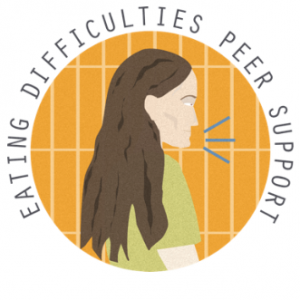Karen Chapman, a Mental Health advisor with Wellbeing Services, has written the following post with advice on managing an eating disorder during these unprecedented times. Jo Keeler, the founder of the Eating Difficulties Peer Support Group, has kindly contributed.
The current pandemic has been a very challenging time for all, and for those experiencing an eating disorder it may have been particularly difficult. Eating disorders are tough, and perpetuating factors can be triggered by changes to routine, isolation or conflicts within households.
As we continue coping with the pandemic, we can see our world has changed to how we knew it before. For those recovering from or experiencing an eating disorder these times can be very unsettling. The gyms and activity centres are closed, there is a reduced ability to go outside, and there are restrictions in the supermarkets and a reduced availability of specific foods. You may struggle with being isolated or living with family when you were not expecting to, and the future may feel uncertain. Perhaps having to make decisions in a supermarket has lead to panic or avoidance when the foods that you feel comfortable buying, without leading to guilt or fear, are not there. All of this can lead to increased anxieties and more to battle with whilst experiencing an eating disorder.

If you need support, please contact Wellbeing Services at wellbeing@exeter.ac.uk
It is important to recognise this. You may feel you are slipping back into more disordered behaviours or your eating disorder thoughts are louder in your mind than usual. Don’t be hard on yourself for slipping back a little. If you have recognised that you are struggling more, that’s a really good sign and you can do something about it to prevent things getting any worse. Remember that recovery isn’t a straight line, it’s more of a wavy line of ups and downs along the way. Don’t give up hope and keep taking those small steps forward. Please reach out to those who you feel you can trust.
Creating a routine and a new norm has been key for some. People also find it useful to try to be kinder to oneself (which can be hard at times), but even if you try to dilute or neutralise any harsh or fixed thoughts this is a form of self-compassion. It may be helpful to try writing your thoughts down in a journal if you find it hard to verbalise them to others. People also find it useful to limit their exposure to unhelpful social media – whether that’s having a break from social media, or only following pages that are pro-recovery, inspirational or positive.
One person has described surviving lockdown with an eating disorder as the following:
“I found the loss of my normal routine really difficult to begin with. My whole life revolves around knowing exactly what I’m going to and when I’m going to do it. Losing that was very scary and I was worried about relapse. I have created a new ‘quarantine routine’ which has massively helped me, but now I’m worried about when things go back to normal, I know I will really struggle to adapt to the change away from this new way of life and back into my old routine. I’m worried that I will see my social anxiety become worse as I haven’t been around people as much. I know I have my family and professional support though, and try to remember that I have managed to adapt before and will manage it again.”
Another person has shared their experience as below:
“Coping with an eating disorder in normal day-to-day life is challenging enough, but in lockdown it’s even harder. With everything that’s been going on recently I have found that my anxiety levels have been much higher than usual, which is often an easy way for Eating Disorder thoughts to take over. Since being back home I have much less control over what I’m eating and I struggle a lot when my routine is suddenly changed; succumbing to my eating disorder can often act as a coping mechanism. However, I’ve tried to adapt to the uncertainty as best as I can. It’s really important to me to keep challenging the foods that I have been in fear of, and not let lockdown make me feel guilty for consuming more of a particular food. If my mind feels clouded with negativity, a daily walk or some yoga helps me put things into perspective and remember there is more to life than my eating disorder. I also think calling a friend for a catch up is invaluable and can really lift my mood if all I can think about is what I’m eating. I reassure myself that every emotion I’ve been feeling is completely valid in such a confusing time, and that when it all ends, I will come out the other side having built more resilience against my eating disorder.”
From an individual who considers themselves recovered:

You can find out more about the Eating Difficulties Peer Support Group here: www.facebook.com/EDPSGexeter/
“I’ve been recovered from my eating disorder for 5 years and that largely is part to moving from a challenging environment and gaining some independence. This lockdown period has been extremely challenging, in some ways, mirroring some of the circumstances where my difficulties began. The loss of control, lack of ability to access my support network, increased food-talk in the public and general stress has made me worry about symptoms returning. Speaking to others in a similar situation to myself helped me recognise that this objectively is a very challenging time, even for those without a susceptibility to mental health problems. I have found it helpful to reconnect myself with other aspects of my identity and interests that are not related to food, exercise or appearance. For example, I’ve spent time doing arts and crafts, meditating and watching funny movies. I’ve also made an effort to reconnect with my values and recovery journey, to remind myself that it is periods of very challenging times that have enabled me to be where I am today. I have done this before and have come out the other side, and I can do it again.”
It is really important to recognise the challenges you may face as this can empower you to adapt and take small steps forward.
Helpful resources
Wellbeing Services and Jo collaborated on a webinar on 20th May that you can watch using the link below:
- Webinar link: Managing Eating Difficulties During Lockdown
- Webinar resource list: Resource_List_for_Managing_Eating_Difficulties_Webinar
Wellbeing Services also offer individual support sessions for students experiencing eating difficulties. Support sessions are open to all students, and no assessment or referral is necessary; sessions can be booked directly by students. Please scroll down the page below to find out more:
https://www.exeter.ac.uk/wellbeing/support/eatingdifficulties/
Please also see Beat’s website for top tips on staying well:
https://www.beateatingdisorders.org.uk/your-stories/recovery/tips-coping-during-coronavirus